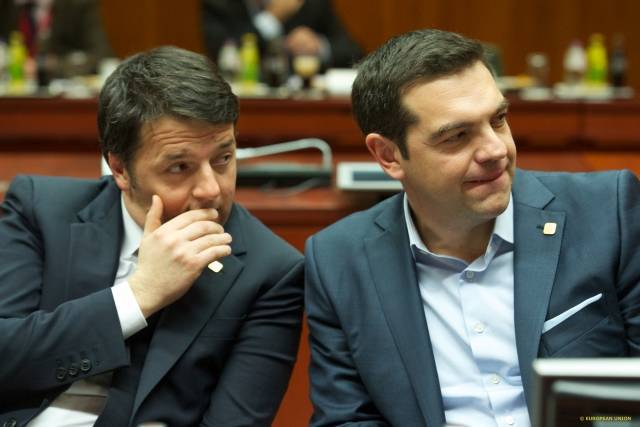Grexit: The View from Italy
The turmoil over a possible Greek exit from the Euro has spillover effects on other European countries, including Italy, one of the creditor nations to Greece. Italian opinions for and against the position of the five-month-old Greek government remain divided, but the already visible fallout includes a boost for the politics of populism.
ROME – Italy has no lack of social stresses. A hotly debated bill to recognize civil unions is slated for an August vote in Parliament. Migrants continue to flood onto Italian shores and into Italian cities, where apartment thefts are on the rise along with anti-immigrant sentiment. The recession that began in 2008, despite a few positive signals, continues. Add to these the problem of Greek indebtedness; and in the famous 322 billion ($352 billion) Euro Greek debt are some Euro 40 billion ($43.74 billion) owed to Italy.
The turmoil over a possible Grexit – that is, the Greek exit from the Euro – is far from over, but its spillover effects on other European countries, including creditor Italy, are already becoming visible. Opinions for and against the position of the five-months-old Greek government are divided, but there is nevertheless fallout. As Italian commentator Stefano Folli remarked Wednesday, “Irritation towards a German-dominated Europe is producing unpredictable baggage.” Some here complain that Italy should have played a larger role as negotiator. Others here, and vox pop, show anti-German resentment; one unhappy example is that “In imposing totalitarian and almost dictatorial policies, Germany has come into the open.”
No less importantly, the anti-Euro sentiment reflected in the long battle over the Greeks’ ability to continue within the framework of Europe and the Euro, when analyzed together with other tensions, is playing into the hands of populist politicians. Beppe Grillo’s Movimento Cinque Stelle (M5S) had slumped from its 25% it had claimed in the national general elections of 2013, but has now recovered. This week’s Istituto Piepoli poll results, reported by ANSA news agency, show that the M5S once again claims the allegiance of one out of four voters (25%).
Grillo loudly backed the anti-Euro sentiment represented by the Greek “No” referendum vote, which he himself sat out in Athens on July 5. “What a fantastic result for everybody,” Grillo exclaimed when a “No” victory was clear. “They’ve decided something that has nothing to do with finance or the economy – it’s geopolitics. This is democracy.” Grillo was not alone in championing the “No” vote. Others on the left who traveled to Athens to cheer on the anti-Euro voters were Nichi Vendola of the Sinistra Ecologia Liberta’ (Left-Ecology-Freedom, or SEL); Stefano Fassina, who had just quit the Partito Democratico (PD); Alfredo D’Attore, a moderate who is in the PD directorate, and Paolo Ferrero of Rifondazione Comunista.
Cheering from the sidelines in Italy for the same reason were several right-wingers. Renato Brunetta of former Premier Silvio Berlusconi’s Forza Italia exulted that,”In Greece democracy won, and now nothing will be the same as before in Europe.” For Matteo Salvini of the Lega, “If [Premier Matteo] Renzi doesn’t pay attention to this, he’s nuts,” said Salvini. “Europe simply must change its treaties and its coinage. The “No” victory is a slap in the face for the Euro creeps who are leading us into famine…. Yes to a new Europe founded on work and respect for people. And if Renzi doesn’t get it, get rid of him!” The result: Berlusconi’s party is split over the Greek question, and Salvini’s continues its upward ascent, at present claiming 15% (some polls say over 16%).
In Italian political terms, it does not matter that Greek Premier Alexis Tsipras ignored the referendum vote and capitulated, accepting the European financial czars’ Draconian conditions. All told, the anti-Euro, anti-German, anti-austerity sentiment has already helped to push the populist right in Italy to well over 40% of the electorate, even as Renzi’s PD continues to falter, losing one percent in just this past week, for a total drop of 3% in the past month, to 32.5% from its 40% of 2013.
Opinion on the actual question of what is to be done remains divided. This is spelled out by Roberto Napolitano, who is editor-in-chief of the financial daily Il Sole-24 Ore. Napolitano warns that to overturn the Euro would take us into “a sea of turbulence, ending with effects on our taxes and hence on the cost of [repayment] of our public debt. In that case Italy would pay the highest price. [But] Europe must recover its strategic vision so as to deal, as one, with the question of public European debt whose ceiling, set at 60% of GNP for all the countries, is anachronistic.” (My translation for the newspaper’s, see >>>)


































i-Italy
Facebook
Google+
This work may not be reproduced, in whole or in part, without prior written permission.
Questo lavoro non può essere riprodotto, in tutto o in parte, senza permesso scritto.